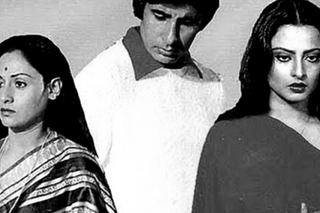
Woe Is Me! “I Can’t Stand My Best Friend’s New Boyfriend”
A series in which The Swaddle team indulges your pity party with advice you’ll probably ignore.

Woe Is Me! is a series in which The Swaddle team indulges your pity party with advice you’ll probably ignore.
“My best friend’s boyfriend is extremely quiet and sulky around us. We’ve tried to talk about his interests and do things he likes, but he refuses to try and get along with our group of friends. How do I tell my best friend that I don’t want to hang out with her unless she shows up sans boyfriend? ”
— Your Man Is My Sleeping Pill
SM: I feel like this is a universal problem, that everyone deals with at some point in time. From my experiences, of both dealing with closed up SOs and being one myself, sometimes you just need to let the sulky SO be. If your friend doesn’t change her behavior much around him, except to check in on him every now and then, I think you should get used to his quiet presence. As you said, you’ve tried from your side. If he feels up to it, he’ll do it. But my guess is if y’all hang out more, life will do it, with some kind of common circumstances where a conversation is natural, or a shared bond of comfortable silences. If this doesn’t work, you can bring it up with her, but I’d say more in a way of “why is he so shy,” or “I really want us to be friends,” rather than excluding him altogether.
LG: It can be difficult for a group to adapt to a friend’s partner – and vice versa! Your friend seems like she surrounds herself with good people, people who care about the people she cares about, or who at least want to (that’s a compliment to you, btw). So, let’s assume her boyfriend is one such person, too, based on her track record. In which case, it’s probably not an act of refusal on his part. Maybe he’s a quiet, low-key dude amid a bunch of tight-knit extroverts. Maybe he’s so anxious over making a good impression on his girlfriend’s friends that he gets tongue-tied. Maybe he’s dealing with a personal or familial problem that is none of your business. Maybe he’s been unfortunate enough to contract severe food poisoning each time he’s met you and while hanging out, he can only focus on holding it in. My point is, you seem awfully quick deny him the benefit of the doubt and to write him off, which isn’t actually your job as a friend. Assuming he treats your friend well, it’s your job to keep including him because you’re someone who cares about the people your friend cares about. Telling her you don’t want to hang with her unless she’s solo is a quick way to alienate her and become an even bigger ass than the one you’ve assumed he is.
KB: Alright, Ms. Brilliant Conversationalist, I’m going to give you a hard truth: it’s not him, it’s you.
And I say this out of respect, kindness, and a deep reservoir of knowledge that can only come from having experienced this exact same phenomenon too many times to count. I’ll share with you my eureka moment:
One day, I was hanging out with some friends I only see about once a year, and they were talking about someone’s new significant other. The conversation was entirely about how incredibly dull, withdrawn, and unfriendly he is; how he came on a long weekend trip with them and their friends and was quiet and sulking the entire time, and how they dreaded ever seeing him again and could not understand how their bright, vibrant friend could ever date such a dud. Here’s the thing, though: as they spoke, I started piecing together contextual clues and realized that not only did I know this man they were discussing, he was actually a very dear friend of mine! And I do not find him dull, or rude, or quiet, quite the opposite; I find him brilliant, engaging, charming and kind.
And that’s when I realized, we are all different versions of ourselves in different contexts. Some people bring out the comedian in us, others the poet, others the rock star, and some people, unfortunately, make us feel isolated or misunderstood or judged, and that’s when we become an unrecognizable version of ourselves. And so it’s entirely possible that you and your friends think you are being inclusive and welcoming, but in fact, through constantly retelling inside jokes, or making fun of his job (“but it’s a joke!”), or some other subtle social cue of non-acceptance, you are making him feel rejected. And so he retreats.
I encourage you to approach him with kindness and an abundance of graciousness when he is ‘alone’ in the company of your group of friends. You lose nothing by choosing this route.
Of course, it’s also entirely possible that he just sucks. If that’s the case, whatever you do, do not tell your friend what you think of him. And for the sake of a friend you love, remember that either a) they will eventually break up because he sucks, or b) they will stay together because she loves him in all his sucky glory, and either way, she will always remember that you supported her (or didn’t).
ADT: You know, while I’ve never felt this way about a friend’s new boyfriend, I’ve always identified with the surly best friend’s boyfriend in question. I find the idea of being introduced to friends nightmarish! Am I matching up to the exacting standards set by these random people for someone they love so much? I know that I’ve often underplayed relationship issues around my own friends to spare the fierce disdain that any hypothetical lousy partner of mine will ignite in my friends’ brains. Perhaps, no matter how much you attempt to make your best friend’s boyfriend welcome, he’ll still feel surly because being under the scanner around you all is frankly, exhausting. All I’m thinking about in these situations is if I’m good enough, even though I’m well aware that I’ll be roasting fodder for something or the other — like your best friend’s boyfriend is for you guys.
I do see that you’ve attempted to do things he likes, and talk about things he likes — fantastic, that’s a great start! Keep trying, making sure your interest in his interests comes off as genuine, and not transparent pandering (people can tell when you do things like you’re doing them a favor!). And when you’ve tried your best to no avail, just continue life like everything’s normal — a surly partner is not more than a mild irritant to ignore, let alone a massive inconvenience to be eliminated.
DR: Actually, I’m quite torn about how to advise you. Sometimes, people with social anxiety find it extremely difficult to bond in a social setting, no matter how warm and welcoming the people there might be. There have been times when, despite wanting to strike a rapport with friends of a date, I have found myself rapidly withdrawing into a shell when the situation presented itself. Over the years (and over several partners), I’ve managed to conquer it, to some extent — introducing alcohol to the scenario works for me, so does having a personal rapport with more than one person in the group.
Since your friend seems important enough to you, why don’t you try to spend some one-on-one time with him? Perhaps, that’ll help him open up to you, and subsequently, also feel more comfortable around you in a group. I understand that it is, undoubtedly, exasperating, and frankly quite draining, to have to put up with someone who refuses to meet you even half-way through despite your best efforts to bridge the gap. But, before you decide whether you should cut your friend off completely, maybe, you can try the tricks I suggested? If not, I think you should let her know your issues. If she cares, she’ll try to take charge of things herself, or she’ll throw a fit about it and stop talking to you — in which case, she wasn’t worth this woe at all!
Related


Why Lockdown Has Us Doing Things We Loved As Children
